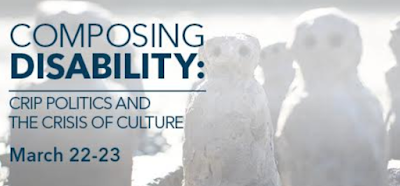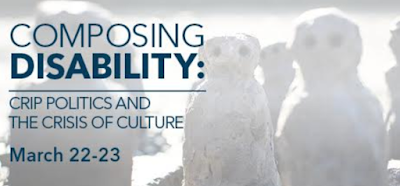 We are pleased to announce that Composing Disability, GW’s biennial Disability Studies conference, returns on March 22-23, 2018. The full program will be posted soon, and the keynote for this event is UK-based artist-activist Liz Crow. Crow is the founder of Roaring Girl Productions and works with performance, film, audio, and text. Her work has been shown at the Tate Modern and the Smithsonian Institution, as well as on television and at festivals internationally. Her most recent project is the 2015 performance piece Figures, a mass-sculptural performance that makes visible the human cost of austerity and urges action against it. Using excavated raw river mud and taking up residence on the streets and foreshore of central London, Crow sculpted 650 small human figures, each one representing an individual at the sharp end of austerity. With making sessions coinciding with tide times on the nearby Thames, at the incoming tide, the newly-sculpted figures were moved to safety. At each low tide, the artist returned to sculpt more figures, in an endurance ritual that spanned 11 consecutive days and nights in all weathers.
We are pleased to announce that Composing Disability, GW’s biennial Disability Studies conference, returns on March 22-23, 2018. The full program will be posted soon, and the keynote for this event is UK-based artist-activist Liz Crow. Crow is the founder of Roaring Girl Productions and works with performance, film, audio, and text. Her work has been shown at the Tate Modern and the Smithsonian Institution, as well as on television and at festivals internationally. Her most recent project is the 2015 performance piece Figures, a mass-sculptural performance that makes visible the human cost of austerity and urges action against it. Using excavated raw river mud and taking up residence on the streets and foreshore of central London, Crow sculpted 650 small human figures, each one representing an individual at the sharp end of austerity. With making sessions coinciding with tide times on the nearby Thames, at the incoming tide, the newly-sculpted figures were moved to safety. At each low tide, the artist returned to sculpt more figures, in an endurance ritual that spanned 11 consecutive days and nights in all weathers.
 |
Liz Crow sculpting on the banks of the Thames
in the 2015 performance piece Figures |
Composing Disability is sponsored by the Department of English, the English Graduate Student Association, the GW Student Association, the Disabled Student Association, the University Writing Program, Disability Support Services, and the Office for Diversity, Equity, and Community Engagement. It is also sponsored by C-AHEAD. The full program will feature leading scholars from the US, Canada, Brazil, and the UK.
The theme for this year’s conference is “Crip Politics and the Crisis of Culture.” In 2016, Oxford Dictionaries named “post-truth” as Word of the Year, putting forward an adjective “relating to or denoting circumstances in which objective facts are less influential in shaping public opinion than appeals to emotion and personal belief.” The “post-truth” era in part marked the emergence of a new and global authoritarianism evident in multiple locations around the world. It also marked a moment in which the neoliberal consensus, itself no stranger to evasions of the truth, was in crisis, from Brazil to the United Kingdom, from France to South Korea, from Mexico to Spain, and of course the United States. The fracturing of the neoliberal consensus has happened on the left but—especially with the election of Donald Trump to the U.S. presidency—has consolidated even more on the right, even if the extreme racism, nationalism, and protectionism of the new authoritarianism generally masks an even deeper entrenchment of a global austerity politics that protects global finance and sustains neoliberal business as usual.
What might disability politics, disability arts, and disability studies look like in this “post-truth” era or in other eras in which the term word of the year might resonate? Does the “post-” in “post-truth” invite us to interrogate the making and breaking of history, and of time itself? What is the relationship between alternative facts and speculative fictions? How have crip bodies, minds, and behaviors been caught up in these, and other, cultural crises across time or space? How have disability politics and theory always contended with ableist evasions of basic facts connected to disabled lives, experiences, knowledges? Conversely, in what ways does the new authoritarianism present decidedly new challenges for crip politics and theory? Composing Disability 2018 takes stock of the current moment while recognizing that what we might term “the crisis of culture” is not located solely in the present moment. The panels and papers featured at this event pose these and similar questions across various historical periods and cultural locations of disability.
 We are pleased to announce that Composing Disability, GW’s biennial Disability Studies conference, returns on March 22-23, 2018. The full program will be posted soon, and the keynote for this event is UK-based artist-activist Liz Crow. Crow is the founder of Roaring Girl Productions and works with performance, film, audio, and text. Her work has been shown at the Tate Modern and the Smithsonian Institution, as well as on television and at festivals internationally. Her most recent project is the 2015 performance piece Figures, a mass-sculptural performance that makes visible the human cost of austerity and urges action against it. Using excavated raw river mud and taking up residence on the streets and foreshore of central London, Crow sculpted 650 small human figures, each one representing an individual at the sharp end of austerity. With making sessions coinciding with tide times on the nearby Thames, at the incoming tide, the newly-sculpted figures were moved to safety. At each low tide, the artist returned to sculpt more figures, in an endurance ritual that spanned 11 consecutive days and nights in all weathers.
We are pleased to announce that Composing Disability, GW’s biennial Disability Studies conference, returns on March 22-23, 2018. The full program will be posted soon, and the keynote for this event is UK-based artist-activist Liz Crow. Crow is the founder of Roaring Girl Productions and works with performance, film, audio, and text. Her work has been shown at the Tate Modern and the Smithsonian Institution, as well as on television and at festivals internationally. Her most recent project is the 2015 performance piece Figures, a mass-sculptural performance that makes visible the human cost of austerity and urges action against it. Using excavated raw river mud and taking up residence on the streets and foreshore of central London, Crow sculpted 650 small human figures, each one representing an individual at the sharp end of austerity. With making sessions coinciding with tide times on the nearby Thames, at the incoming tide, the newly-sculpted figures were moved to safety. At each low tide, the artist returned to sculpt more figures, in an endurance ritual that spanned 11 consecutive days and nights in all weathers.





